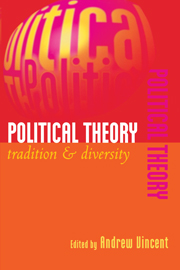Book contents
- Frontmatter
- Contents
- Preface
- List of Contributors
- Introduction
- 1 Political Theory and Conceptual Change
- 2 Political Theory and the Problem of Anachronism
- 3 Utilitarianism as a Public Philosophy
- 4 Rational Choice Political Theory
- 5 Republican Political Theory
- 6 Liberalism, Multiculturalism and Oppression
- 7 Postcolonialism and Political Theory
- 8 Legal Positivism and Political Power
- 9 Political Theory, International Theory, and the Political Theory of International Relations
- 10 Method Matters: Feminism, Interpretation and Politics
- 11 The Political Philosophy of Deleuze and Guattari
- 12 The Object of Political Theory
- Index
2 - Political Theory and the Problem of Anachronism
Published online by Cambridge University Press: 29 March 2011
- Frontmatter
- Contents
- Preface
- List of Contributors
- Introduction
- 1 Political Theory and Conceptual Change
- 2 Political Theory and the Problem of Anachronism
- 3 Utilitarianism as a Public Philosophy
- 4 Rational Choice Political Theory
- 5 Republican Political Theory
- 6 Liberalism, Multiculturalism and Oppression
- 7 Postcolonialism and Political Theory
- 8 Legal Positivism and Political Power
- 9 Political Theory, International Theory, and the Political Theory of International Relations
- 10 Method Matters: Feminism, Interpretation and Politics
- 11 The Political Philosophy of Deleuze and Guattari
- 12 The Object of Political Theory
- Index
Summary
Political theory has an uncomfortable relationship with history. Traditionally seen as the principal font of political wisdom, history has long performed a theoretical function (Nadel 1965: 49ff.). Modern professional historians have been apt to disown political theory, for they now have other fish to fry; while political theorists, in part the mutating progeny of the old exemplum history, like to cook up such dishes for themselves (see Burrow et al. 1983). In the present context, history may be viewed both as the facts surviving from a hypothetical totality and as a disciplined study of the residue of human activity. The distinction is unstable, and what follows is perilously schematic; but it should be sufficient to make a simple point: that what we accept as political theory is both partly conditioned and subverted by a dependency on historical writing. Further, it is unclear whether those calling themselves political theorists have established sufficiently autonomous and uniform criteria of judgment to enable them to use history without also importing the incubus of the historian's own destabilizing priorities. Certainly, as historiography changes, so we can expect it to continue to have a vicarious impact on political theory. Before discussing such issues, however, a few words on history as res gestae and political theory are in order; for from this meaning of history arises the primal sense of anachronism, the consequences of which, I believe, are now at the heart of the troubled relationship between political theory and history.
- Type
- Chapter
- Information
- Political TheoryTradition and Diversity, pp. 45 - 66Publisher: Cambridge University PressPrint publication year: 1997
- 1
- Cited by



